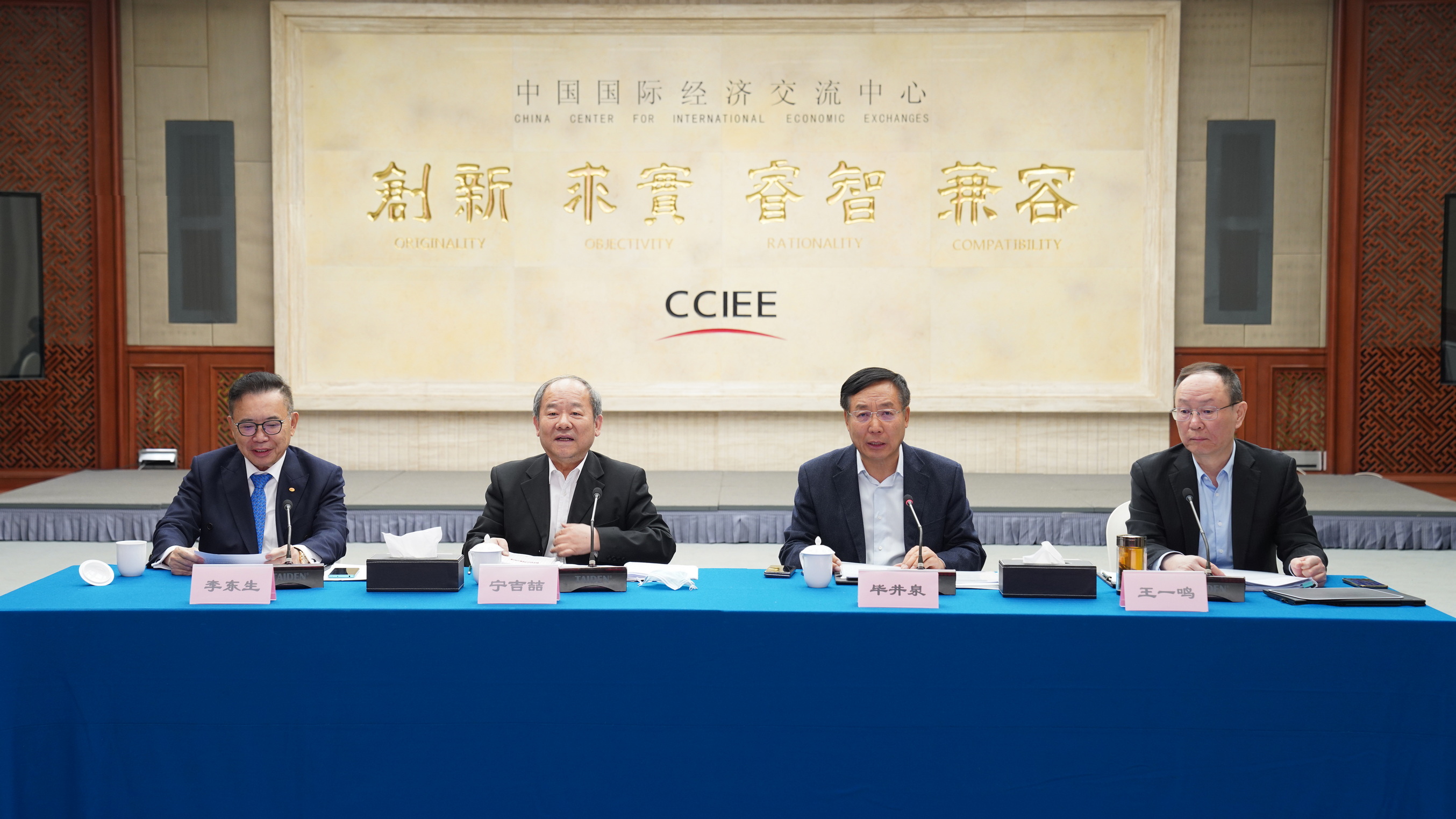CCIEE Held 161st Monthly Economic Talk with the Theme of To Study and Implement the Spirit of the National “Two Sessions”
- Time:2023-03-23
- source:CCIEE
On March 14, 2023, the China Center for International Economic Exchanges (CCIEE) held the 161st Economic Monthly Talk via video conference with the theme of To Study and Implement the Spirit of the National “Two Sessions”. The meeting was presided over by Bi Jingquan, member of the Standing Committee and Vice Chairman of Economic Committee of the Chinese People's Political Consultative Conference (CPPCC), Executive Vice Chairman of CCIEE; Ning Jizhe, member of the Standing Committee and Vice Chairman of Economic Committee of CPPCC, Vice Chairman of CCIEE; Wang Yiming, Vice Chairman of CCIEE and Chairman of the Academic Committee in CCIEE; Li Dongsheng, deputy to the National People's Congres and Chairman of TCL, delivered speeches respectively.

Ning Jizhe pointed out that in 2023, in order to achieve the main expected goals of economic and social development, macroeconomic policies are featured with five characteristics: "positiveness, prudence, continuity, pertinence, and coordination." Firstly, "positiveness" is reflected in the need to strengthen the effectiveness of proactive fiscal policies. By increasing the deficit ratio, appropriately expanding the scale of local government special bonds, and other measures, policy support for expanding domestic demand should be enhanced. Secondly, "prudence" is reflected in the requirement for precise and forceful monetary policies. The growth rate of broad money supply (M2) and social financing should be basically matched with the nominal economic growth rate. Thirdly, "continuity" is manifested in the improvement of tax and fee preferential policies. Measures such as tax reduction, fee reduction, and tax refund should be continued or optimized as appropriate. Fourthly, "pertinence" is demonstrated by the need to continue to do a good job in the grassroots "three guarantees" (guarantee the basic people's livelihood, wages, and operating expenses) work and further play the role of direct mechanism. Fifthly, "coordination" is reflected in the need for fiscal policies, monetary policies, industrial policies, science and technology policies, and social policies to form a joint force to promote high-quality development.
Wang Yiming stated that this year is the opening year for fully implementing the spirit of the 20th National Congress of the Communist Party of China (CPC), as well as the crucial year for the start of building a modern socialist country. Four aspects of work need to be done. Firstly, it is necessary to steadfastly promote high-quality development, deeply implement the strategy of innovation-driven development, promote the deep integration of innovation chains and industrial chains, strengthen the cultivation of top-notch scientific and technological talents, and enhance original innovation capabilities. Secondly, it is important to actively and effectively expand domestic demand, enhance the consumption capacity of residents, improve consumption conditions, and innovate consumption scenarios. To encourage the development of diversified forms of employment, increase residents' actual disposable income, reasonably improve consumer credit to support consumption in areas such as housing improvement and new energy vehicles, accelerate the organic integration of online and offline consumption, and foster new forms of consumption. Thirdly, it is necessary to vigorously boost market confidence, stimulate corporate investment enthusiasm, unleash the potential for resident consumption, and promote social innovation and creativity. Fourthly, it is important to persist in advancing high-level opening-up. To steadily expand institutional opening-up, deepen innovative development pilot projects in service trade, cultivate new forms and models of digital trade, and build an institutional system and regulatory system that align with international high-standard rules.
Li Dongsheng believes that in the future, China's manufacturing industry should further extend towards the upstream of the industrial chain and accelerate transformation and upgrading, so as to quickly achieve global leadership in terms of overall competitiveness and level of "Made in China". In the face of changes in the global economic and trade landscape, Chinese enterprises need to adjust their globalization strategies, shifting from simply exporting products to exporting industrial capacity and establishing industrial chains in major countries and markets worldwide, while integrating into local development. They should contribute to the local socioeconomic development while promoting their own growth and creating greater space for Chinese enterprises, thereby driving balanced global economic development.
After the speeches, there was an interactive exchange between participating experts and the media. Some researchers and member units,of CCIEE, research institutions, enterprises, and news media participated in the conference through the internet.
